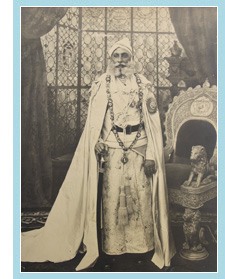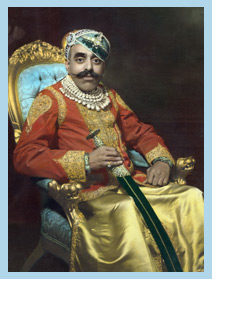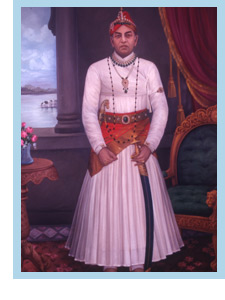

Our Quest
1. Pre-1947: In the State of Mewar

 For the 1500-year old House of Mewar, acknowledged as the world's oldest-serving dynasty, every century has been fraught with challenges and transformations. Momentous events have, time and again, tested the enduring legacy of Custodianship and the Custodian's commitment to continue serving as the Diwan of Shri Eklingji, preserving core values of the House of Mewar.
For the 1500-year old House of Mewar, acknowledged as the world's oldest-serving dynasty, every century has been fraught with challenges and transformations. Momentous events have, time and again, tested the enduring legacy of Custodianship and the Custodian's commitment to continue serving as the Diwan of Shri Eklingji, preserving core values of the House of Mewar.
In the State of Mewar, critical issues regarding the Royal Family were decided by competent authorities of the State. Wealth management, equitable distribution of assets, and succession planning according to the rule of primogeniture, were issues for which there were well-established precedents for the State of Mewar to follow.
The precedents and rulings adhered to principles of, what modern management terms today as, consensus management and conflict resolution.
During this period of established judicial and legal systems there was a continuity of interpretation provided by senior administrators, jurists and legal luminaries. Mahendraj Sabha was the highest judicial council of Mewar and the Maharana was its President to ensure continuity and uniformity of interpretation.
2. Post-1947 till 1971: After State of Mewar’s merger with Union of India

 In 1947, India gained Independence from British Rule. The State of Mewar was now merged into the Union of India. The State of Mewar’s judiciary, revenue systems, army, police force, educational system and day-to-day governance were handed over to the Government of India. In effect, the governing apparatus of the State of Mewar was dissolved.
In 1947, India gained Independence from British Rule. The State of Mewar was now merged into the Union of India. The State of Mewar’s judiciary, revenue systems, army, police force, educational system and day-to-day governance were handed over to the Government of India. In effect, the governing apparatus of the State of Mewar was dissolved.
The President of India was now, under the new Republic, the approving authority regarding all matters of succession in the country. This was required because the rule of primogeniture had to be followed at all times.
The decision which was carefully taken by the President of India was final and binding. In this period of enormous political and social change, the system of Presidential authority ensured legal continuity and uniform interpretation in matters relating to succession in the Royal Families.
3. Post-1971: After the Constitutional amendment
 On July 31, 1971, in contravention of the undertakings made at the time of India’s Independence and merger of Princely States, the Government of India amended the Constitution to abolish all privileges for the Princely States. By the Constitution (Twenty-sixth Amendment) Act, it was stated: “The concept of rulership, with privy purses and special privileges unrelated to any current functions and social purposes, is incompatible with an egalitarian social order. Government has, therefore, decided to terminate the privy purses and privileges of the Rulers of former Indian States. It is necessary for this purpose, apart from amending the relevant provisions of the Constitution, to insert a new article therein so as to terminate expressly the recognition already granted to such Rulers and to abolish privy purses and extinguish all rights, liabilities and obligations in respect of privy purses.” To read more click here
On July 31, 1971, in contravention of the undertakings made at the time of India’s Independence and merger of Princely States, the Government of India amended the Constitution to abolish all privileges for the Princely States. By the Constitution (Twenty-sixth Amendment) Act, it was stated: “The concept of rulership, with privy purses and special privileges unrelated to any current functions and social purposes, is incompatible with an egalitarian social order. Government has, therefore, decided to terminate the privy purses and privileges of the Rulers of former Indian States. It is necessary for this purpose, apart from amending the relevant provisions of the Constitution, to insert a new article therein so as to terminate expressly the recognition already granted to such Rulers and to abolish privy purses and extinguish all rights, liabilities and obligations in respect of privy purses.” To read more click here
The members of the House of Mewar now became ordinary citizens of India. It was a period of unforeseen challenges. The 75th Custodian, Maharana Bhagwat Singh’s quest was to ensure that the Institution of Maharana remained in perpetuity and in accordance with Indian laws. His mission was to find futuristic solutions, for both the family and emerging businesses, in a democratic environment without compromising his duties and responsibilities as a Custodian.
In 1984, a vacuum was created within the House of Mewar when the eldest son voluntarily seceded, during his father’s time, from the Family. As per the rule of primogeniture, the next in line had to step in and succeed. In the absence of a Constitutionally-empowered redressing authority, the rule of primogeniture was interpreted by individuals as it suited them, the House was now drawn into protracted legal battles.
“There has thus been a dire need to put in place modern mechanisms that can address critical issues of both family management and business management in the present age,” says Shriji Arvind Singh Mewar, the 76th Custodian of the House of Mewar. “This is part of our quest to reinvent, re-strengthen the House of Mewar on legal pillars that are strong, stable, modern and progressive. It is a process that began in the late-1970s, during my father’s time, and continues till date,” he says.
Shriji Arvind Singh Mewar, as the 76th Custodian, has provided stability to the House, making a successful transition into a globalized twenty-first century. Today, he is committed to understanding, imbibing and implementing key principles of family and business management, as successfully practised and shared across the world. “My mission,” he says, “remains the same as that of my forefathers; I am discharging my duties based on the established principles of governance through Custodianship.”
The Family Business Initiatives, undertaken since 2008 and documented on this website, are indicative of his quest to provide strategic leadership to the House of Mewar. Shriji is acknowledged as a pioneer in his generation who is contemporizing the legacy he inherited as the 76th Custodian of the House and keeping it relevant, connected to the real world at all times.
He is also an exemplary role-model for other former Royal Families of India who may be reluctant to take the first steps towards a rational managerial approach to family and business affairs, which is the challenge of the time. To read more click here
